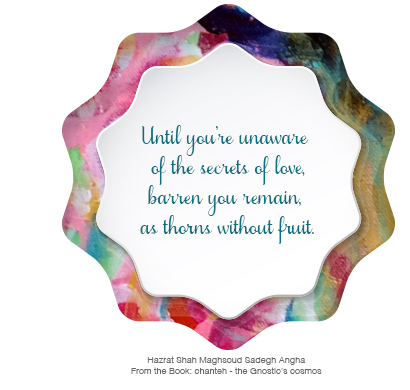Wine and Vinegar
Basic Concepts of Sufis - Part II
By: Lynn Wilcox, Ph.D.
The strongest bonds of any culture are, as Molana Hazrat Salaheddin Ali Nader Angha has stated: “People do as their parents did.”1... The Holy Books strongly address this issue, as quoted earlier. Society/cultures usually teach, with varying degrees of subtlety or blatancy, the superiority of that particular culture. Members of the culture are instructed, often covertly, to perceive persons from other cultures as somehow better than others. The rules and regulations, actions and reactions of any sociocultural group are always justified as being of alleged benefit to the group and its members,. These include the pseudo-religious. Every horrendous act in human history has been so justified. Examples are the genocide of Hitler, the killing of the Native Americans, the inquisitions, and most wars. An additional justification often uses is: “We have their best interests at heart.” Progress, technology, better living, the future--are all excuses for contemporary social behavior. Culture includes the bonds of “academe,” in which, lest we beware, we may be trapped forever-blinded to Truth by reliance on temporal and secular rules, roles, and consequent values, with no sensitivity to, nor experience of, what natural scientists call Nature, philosophers call Existence, and theologians call God.
In the Rumi story2,... the salek’s mistake was to react with cultural habituation and to forget that the word does not convey its meaning. He had insufficient faith, and took the Master’s words literally, becoming fearful, rather than responding to the deeper communicative level beyond words. This behavior ultimately caused the Divine Wine, which was within his reach, to be turned into the vinegar of sociocultural relationships.
At a psychological level, it is the story of a man unexpectedly cognizing his place in the scheme of things and feeling “aidos” before the mysterium tremendum, seeing clearly and unquestionably the inadequacy and humbleness of the personal and the social (both of which used to be combined and called the profane) before the sacred. The story is a stark and symbolic example of the contrast between the acceptance of cultural constructs and constraints, and the freedom of letting go of such earthly attachments, which is an integral part of the way of Sufism. Unfortunately, in western civilization, people have been systematically and deliberately misinformed about the teachings of the Prophets, and have come to view religion as oppressive. Oppression is real, but comes not from the teachings of Moses or Jesus or Mohammad, but from social conventions, from attention to superficialities, from reactionary cultural molds, from stifling social roles. All are prohibited from the gift of true freedom by lacking knowledge of the innermost human values.
The true reality of religion is almost the opposite of the social fiction. Sufism is not bound by, and in fact transcends, the institutional rules and regulations of formal religious structures accumulated over the centuries, for it is the living, beating heart of the reality of religion. In Sufism, the salek travels beyond language and linguistics into the realm of nonverbal, heart-to-heart communication. The communicative level is untainted, culture free. It cannot be explained or described in words; it can only be experienced. As the salek attains greater heart-to-heart communication, he or she becomes purer, letting go of the cultural veils. For this to occur, the salek must becomes purer, letting go of the cultural veils. For this to occur, the salek must “become again as a young child,” in order to relearn the heart-to-heart communication. Rumi’s story illustrates the necessity for heart-to-heart communication, rather than mere words, in order to avoid the bitter vinegar of culture and to attain the Blessed Wine from the divine Cupbearer.
The essence of humanity does not change through time or geography, or culture. Surface habits and practices veil the truth in the innermost heart, the recognition that we are all One. The wine of Sufism, of the lover of the Divine Beloved, stands in stark juxtaposition to the sociocultural vinegar. For each of us, there is a choice to make, which we can only postpone, not avoid. Which will it be, wine or vinegar?
“God Almighty has a wine for his Friends;
When they drink of it, drunk they become,
When they become drunk, pure they become,
When they are pure, they shall melt, when they melt,
They shall be emptied and free, when emptied, they shall seek,
And when they seek, they shall find, when they find, they shall join,
And when they join, they shall unite, when they are united,
There shall be no difference between them and their Beloved.”
Hazrat Amir al-Mo’menin Ali
